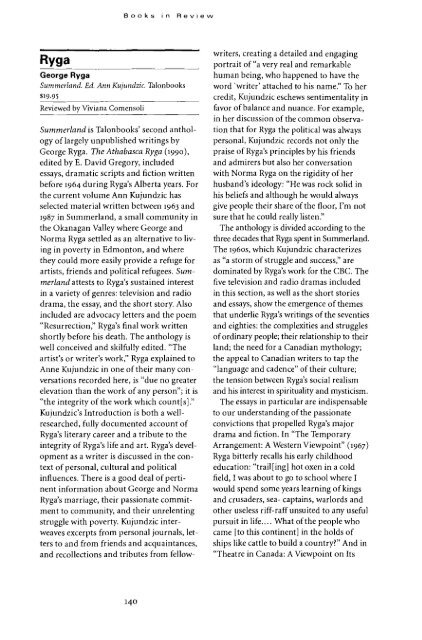To All Appearances A Lady - University of British Columbia
To All Appearances A Lady - University of British Columbia
To All Appearances A Lady - University of British Columbia
You also want an ePaper? Increase the reach of your titles
YUMPU automatically turns print PDFs into web optimized ePapers that Google loves.
Books in Review<br />
Ryga<br />
George Ryga<br />
Summerland. Ed. Ann Kujundzic. Talonbooks<br />
$19-95<br />
Reviewed by Viviana Comensoli<br />
Summerland is Talonbooks' second anthology<br />
<strong>of</strong> largely unpublished writings by<br />
George Ryga. The Athabasca Ryga (1990),<br />
edited by E. David Gregory, included<br />
essays, dramatic scripts and fiction written<br />
before 1964 during Ryga's Alberta years. For<br />
the current volume Ann Kujundzic has<br />
selected material written between 1963 and<br />
1987 in Summerland, a small community in<br />
the Okanagan Valley where George and<br />
Norma Ryga settled as an alternative to living<br />
in poverty in Edmonton, and where<br />
they could more easily provide a refuge for<br />
artists, friends and political refugees. Summerland<br />
attests to Ryga's sustained interest<br />
in a variety <strong>of</strong> genres: television and radio<br />
drama, the essay, and the short story. Also<br />
included are advocacy letters and the poem<br />
"Resurrection," Ryga's final work written<br />
shortly before his death. The anthology is<br />
well conceived and skilfully edited. "The<br />
artist's or writer's work," Ryga explained to<br />
Anne Kujundzic in one <strong>of</strong> their many conversations<br />
recorded here, is "due no greater<br />
elevation than the work <strong>of</strong> any person"; it is<br />
"the integrity <strong>of</strong> the work which count[s]."<br />
Kujundzic's Introduction is both a wellresearched,<br />
fully documented account <strong>of</strong><br />
Ryga's literary career and a tribute to the<br />
integrity <strong>of</strong> Ryga's life and art. Ryga's development<br />
as a writer is discussed in the context<br />
<strong>of</strong> personal, cultural and political<br />
influences. There is a good deal <strong>of</strong> pertinent<br />
information about George and Norma<br />
Ryga's marriage, their passionate commitment<br />
to community, and their unrelenting<br />
struggle with poverty. Kujundzic interweaves<br />
excerpts from personal journals, letters<br />
to and from friends and acquaintances,<br />
and recollections and tributes from fellowwriters,<br />
creating a detailed and engaging<br />
portrait <strong>of</strong> "a very real and remarkable<br />
human being, who happened to have the<br />
word 'writer' attached to his name." <strong>To</strong> her<br />
credit, Kujundzic eschews sentimentality in<br />
favor <strong>of</strong> balance and nuance. For example,<br />
in her discussion <strong>of</strong> the common observation<br />
that for Ryga the political was always<br />
personal, Kujundzic records not only the<br />
praise <strong>of</strong> Ryga's principles by his friends<br />
and admirers but also her conversation<br />
with Norma Ryga on the rigidity <strong>of</strong> her<br />
husband's ideology: "He was rock solid in<br />
his beliefs and although he would always<br />
give people their share <strong>of</strong> the floor, I'm not<br />
sure that he could really listen."<br />
The anthology is divided according to the<br />
three decades that Ryga spent in Summerland.<br />
The 1960s, which Kujundzic characterizes<br />
as "a storm <strong>of</strong> struggle and success," are<br />
dominated by Ryga's work for the CBC. The<br />
five television and radio dramas included<br />
in this section, as well as the short stories<br />
and essays, show the emergence <strong>of</strong> themes<br />
that underlie Ryga's writings <strong>of</strong> the seventies<br />
and eighties: the complexities and struggles<br />
<strong>of</strong> ordinary people; their relationship to their<br />
land; the need for a Canadian mythology;<br />
the appeal to Canadian writers to tap the<br />
"language and cadence" <strong>of</strong> their culture;<br />
the tension between Ryga's social realism<br />
and his interest in spirituality and mysticism.<br />
The essays in particular are indispensable<br />
to our understanding <strong>of</strong> the passionate<br />
convictions that propelled Ryga's major<br />
drama and fiction. In "The Temporary<br />
Arrangement: A Western Viewpoint" (1967)<br />
Ryga bitterly recalls his early childhood<br />
education: "trailing] hot oxen in a cold<br />
field, I was about to go to school where I<br />
would spend some years learning <strong>of</strong> kings<br />
and crusaders, sea- captains, warlords and<br />
other useless riff-raff unsuited to any useful<br />
pursuit in life What <strong>of</strong> the people who<br />
came [to this continent] in the holds <strong>of</strong><br />
ships like cattle to build a country?" And in<br />
"Theatre in Canada: A Viewpoint on Its<br />
140

















